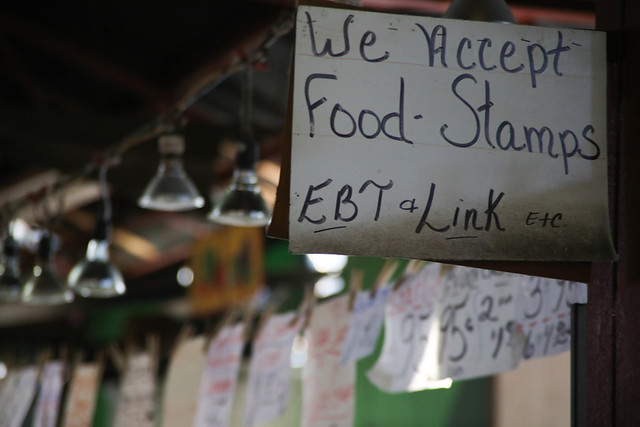Food Stamps Were Her Lifeline
By
Guest Blogger
Posted:
|
Health Care,
Social Insurance, Earned Benefits, & Safety Net
Photo by Paul Sableman
By Murline Gelin
In 2011, Emily was 20 years old and living in a homeless shelter. She had just been kicked out of her house after getting into a physical altercation with her mother. The fight left her with wounds on her back, leg, and arms that had to be treated at a local hospital. As Emily looked for work during the day and returned to a cramped room full of strangers at night, she wondered how she would continue her medical care.
“The nurse at the mental hospital advised me to apply for Medicaid,” Emily reveals. Since Emily had no job, the nurse was confident that Emily would qualify. But to Emily's surprise, her application for benefits was denied. Even though she had no income, the fact that she had the capacity to work made her ineligible. And since she wasn't pregnant and had no kids, there was no other way for her to qualify for Medicaid.
Since leaving the homeless shelter, Emily's life has changed for the better. She currently works part-time as a secretary and has been off of the streets for two years. To this day, she sustains herself, in part, with the food stamps she began receiving at the shelter.
Unfortunately, her health care situation has remained the same; she remains uninsured. She avoids seeking medical care, even though she has a serious blood disorder. Emily thought that the Affordable Care Act would help her plight, but her home state of Florida rejected the Medicaid expansion. If the state had expanded Medicaid eligibility as part of the Affordable Care Act, she would have qualified.
Sometimes Emily can't help being frustrated with the stigma surrounding any effort to help low-income people. Still, she is sympathetic to both sides. “I think that in a lot of ways we are kind of conditioned to be aware of the plight of only specific people. I've been hearing lately about the business owners who now have to provide health insurance and how it's going to be a burden on them. I can respect that, but we are less conditioned to care about people who don't have a say in our economy.”
Despite the challenges she has faced, Emily remains positive. She is grateful for all of the help she has received, including from public programs like food stamps. She imagines what her life would be like without the help. “It would probably be that terrible survival, like you sleep on the steps of the library and you eat thrown away food. You don't shower or have clothes and can't get a job. I've done that.” Emily plans on finishing her college degree and fulfilling her dream of becoming a teacher.
Murline Gelin is a writer with a penchant for social justice and sustainability causes. She enjoys connecting with people through story-focused writing.
Have a story to share about your experience with federal programs or taxes? Share it using our Faces of the Federal Budget tool.
